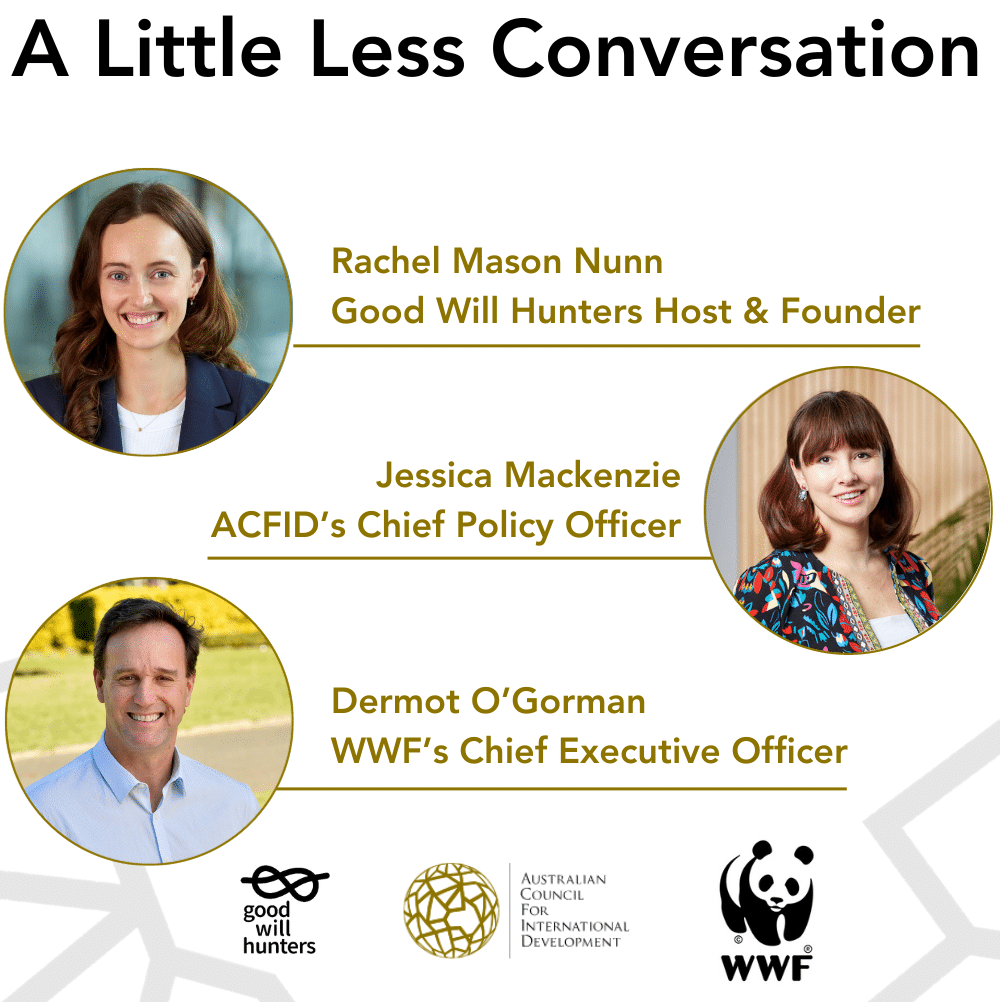When Elvis sang “A little less conversation, a little more action,” he was, undeniably, not thinking about international development.
But we in the development sector regularly think exactly the same thing: there needs to be more action and less talk about what needs doing if we are to meet our targets.
With this in frame, we have co-opted Elvis’ famous line, but have adapted it somewhat: we are now walking around singing, “A little less conversation, a little more climate action.”
With COP28 officially launching last week, it is useful to get a handle on the various elements of climate change policy and maneuverings. With that in mind, the Australian Council for International Development has teamed up with WWF Australia and the Good Will Hunters podcast to produce a new podcast series.
Titled ‘A Little Less Conversation’, the series aims to inform and to stimulate discussion – but perhaps most importantly, press for concerted action in achieving climate goals.
The series takes an episodic look at crucial topics, such as climate diplomacy, loss and damage, climate finance, adaptation, nature-based solutions, intersectionality and climate governance.
In the first episode, hosts Jessica Mackenzie (ACFID’s Chief of Policy), Rachel Nunn (founder of Good Will Hunters and a director with Mandala Partners) and Dermot O’Gorman (CEO of WWF Australia) gather to set the agenda. Their discussion draws in the new international development policy and the role of climate change within it, the asks and advocacy of the region, COP28 and the Australian Government’s new commitment to support civil society in the region.
In the second episode, Rachel and Jess interview Australia’s Ambassador for Climate Change, Kristen Tilley. The conversation draws in climate financing; climate change’s disproportionate impacts on women, people with disabilities or people who identify as LGBTQI; the recent Pacific Island Forum leaders’ meeting and the Australian Government’s future plans when it comes to COP28 and COP31.
It is a remarkably candid and revealing interview, in which Ambassador Tilley lays out her priorities and values and casts more light on issues such as Australia’s responses to multilateral calls over fossil fuel use.
Further episodes include interviews with Australia’s lead negotiator on loss and damage at COP28, David Higgins, the deputy Executive Director of the Green Climate Fund, Henry Gonzalez, Senator David Pocock, former diplomatic heavyweight Howard Bamsey and the ANU’s Sala Dr George Carter, amongst others.
A standout theme of the series has pre-emptively reflected what is shaping up to be a prominent theme of COP28: loss and damage. With the announcement that a loss and damage fund will be set up, discussion over the issue is now moving towards design and implementation.
Loss and damage is a fairly straightforward concept, as it refers, broadly, to restitution for what’s lost as climate change impacts are felt. But with the debate switching up a notch, it is useful to get a solid understanding of the broad baseline concepts of loss and damage.
The latest episode brings together two loss and damage experts: Julie-Ann Richards, strategy lead with the Loss and Damage Coalition, and Dr Melanie Pill of the Lowy Institute, to discuss what it is, where it is going – and where it should be heading.
The series will round out with an interview with David Higgins upon his return from COP28.
COP28 is being held in Dubai from the 28th of November- to 12th December.
With high-income countries still falling well short of the Copenhagen Accord’s commitment to mobilise $100bn per year in climate finance for low- and middle-income countries, expectations for this year’s COP are somewhat muted. WWF has set out its goals for the COP here.
Australia’s new International Development policy sets a direction for our development program, with the introduction of a new target for programs over $3 million to achieve a climate change objective. ACFID has welcomed this target in our analysis of the policy.
With climate change undoubtedly a critical issue to human security, a major global risk to sustainable development and exacerbating existing threats to international stability and prosperity, it is vital that it remains a key component of Australia’s foreign policy.
By Jessica Mackenzie
Chief Policy Officer, ACFID









